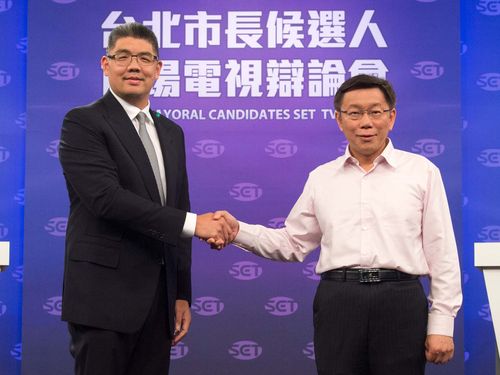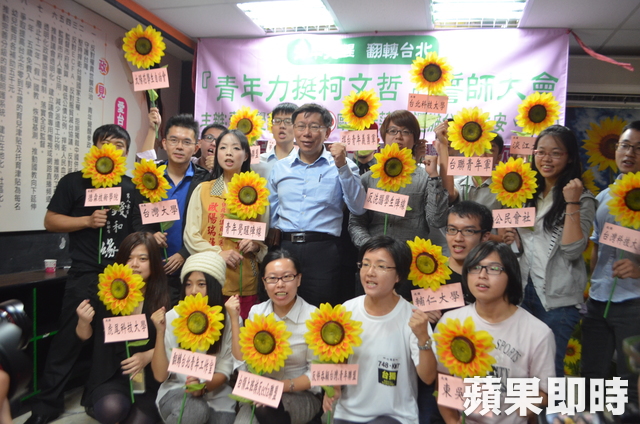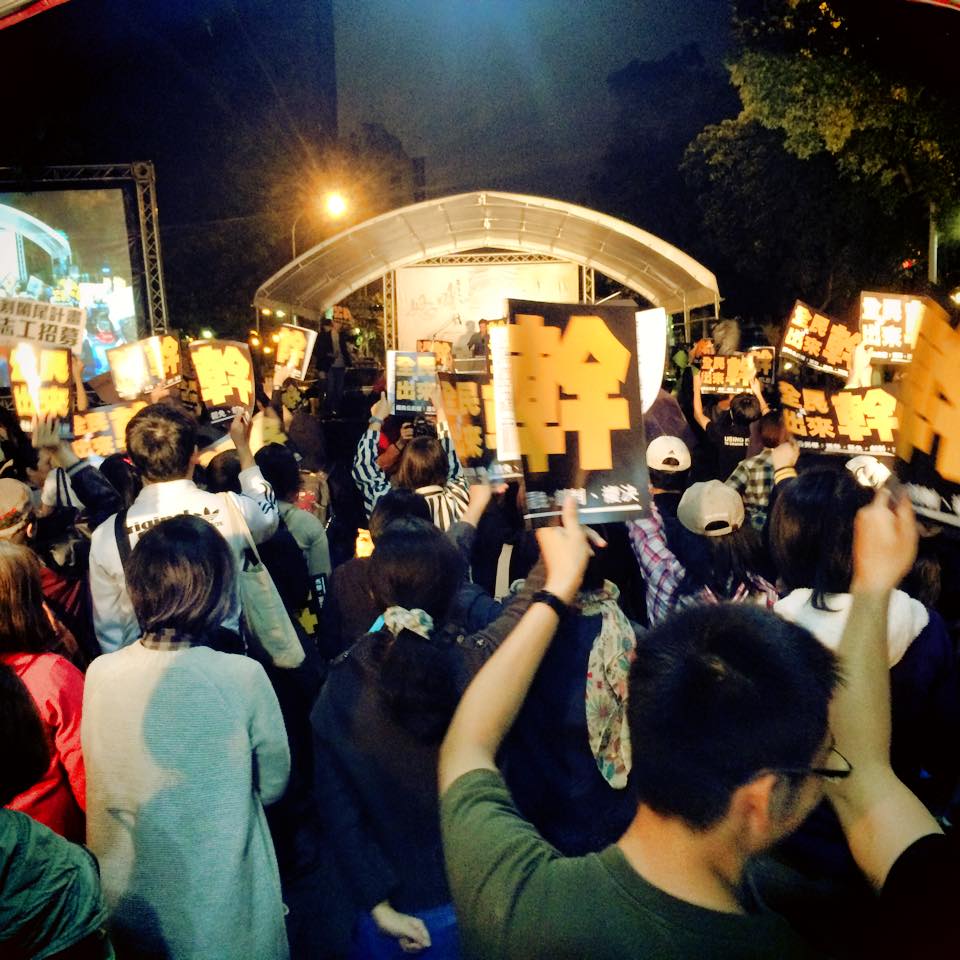Nine-in-One Elections in the Aftermath of the Sunflower Movement
by Brian Hioe
語言:
English /// 中文
Photo Credit: 島國前進 Taiwan March
Taiwan’s Nine-in-One Elections
WITH LESS THAN a month left until Taiwan’s “nine-in-one” elections, the stakes of the political game are high. With candidates competing for offices at all levels of government, all the way from mayoral positions in Taiwan’s special municipalities down to village and borough warden positions, and an unprecedented 11,130 candidates competing for nine categories of office, the “nine-in-one” elections come as quite possibly the most significant event for Taiwanese electoral politics outside of presidential elections. Yet have the rules of the game changed after the Sunflower Movement?
To the extent that politics in Taiwan’s central metropole of Taipei exerts a disproportionate political influence on the rest of Taiwan, most media attention has focused on to the mayoral race for Taipei, shaping itself up to be a heated confrontation between KMT candidate Sean Lien and independent, but DPP-supported candidate Ko Wen-Je. Unsurprisingly, as with any other Taiwanese election in recent memory, the contestation between Lien and Ko has seen much in the way of partisan debate and media scandal.
 Sean Lien (left) and Ko Wen-Je shaking hands before the televised debate on November 7th. Photo credit: SET-TV
Sean Lien (left) and Ko Wen-Je shaking hands before the televised debate on November 7th. Photo credit: SET-TV
But this time around the election is not just about Taipei, there are other major urban centers as Taichung, Tainan, New Taipei City, Kaohshiung, Hsinchu, and Chiayi that are up for election. With the elevation of Taoyuan from county into a municipal center this year, the mayoral candidacy of Taoyuan, too, is up for grabs, much as New Taipei City was previously political terrain to be fought over when Taipei County was elevated from county to municipal center in 2010 as “New Taipei City” during the last round of Taiwanese local elections.
Apart from that the “nine-in-one” elections are the largest elections of its kind in Taiwanese history, with the most posts up for election than any previous set of local elections, what is at stake in the present is the changed political landscape following the Sunflower Movement. While the Sunflower Movement was not concerned with electoral politics, and in effect sought to steer clear of electoral politics, the Sunflower Movement largely directed itself against the effort to push the CSSTA trade bill broaching closer economic ties between Taiwan and China into law through legislative measures which were questionable, if not outright undemocratic.
Yet as KMT now faces public blame for the push to drive Taiwan closer to China and undemocratic means by which the CSSTA was pushed through the legislature, the Sunflower Movement can be said to have dealt a blow to the KMT. However, as dissatisfaction with the increasing conservatism of the DPP in recent years led to a disconnect of youth and civil society groups with the DPP; the Sunflower Movement, too, was emphatic that neither did it support the DPP. Accusations against the DPP of attempting to co-opt the movement, which set up an encampment outside the Legislative Yuan premises shortly after the initial student occupation began, emerged quite quickly. But with efforts from both parties to appeal to a younger electorate, or to encourage a younger generation of activists to enter electoral politics, there was the realization from both pan-Blue and pan-Green that serious efforts to appeal to the young were necessary.
In the Shadows of a Young Democracy
WHERE MANY, particularly western academics, would have it as that Taiwan has already achieved stable democracy following the achievement of a stable two party system in the 1990s with the rise of the DPP or even the peaceful 2008 presidential power transfer from DPP to back to KMT as a metric of having passed Samuel Huntington’s “two turnover test,” it must be pointed out that this claim is founded upon somewhat tenuous grounds. The KMT, in fact, began holding local elections soon after it came to China. When academics or journalists point to Taiwanese “democratization” or the opening up of free elections in Taiwan, usually they are actually referring to the opening up of free election for the national legislature and presidential elections.
But, of course, local elections occurred under the rule of a government under KMT control. As such, while it was possible to run as an independent candidate for local office, the question of KMT party support for local candidates was often determining of whether a candidate won public office or not, given that it was often of necessity for candidates to be able mobilize public support using the KMT party apparatus if they hoped to be victorious. This led largely to the hegemony of the KMT within local party politics.
 Members of the Dangwai Movement being sprayed with water cannons outside the Control Yuan circa 1972.
Members of the Dangwai Movement being sprayed with water cannons outside the Control Yuan circa 1972.
It was such that the Dangwai Movement which aimed to establish a political party outside of the KMT always faced an uphill struggle to field successful candidates; even apart from the persecution and harassment that came from the KMT through its control of the Taiwanese police state under martial law, Dangwai candidates never had the same amount of financial resources to field candidates as did the KMT. And perhaps more significantly, Dangwai candidates were also at a disadvantage where social capital was concerned; the synonymy of the KMT with the Taiwanese party-state meant that the KMT’s capacity to mobilize personal connections and human resources was stronger than that of the Dangwai movement because of party cadres spread throughout Taiwan who could operate at the local level and were institutionalized at the level of local governments.
To date, even after so-called democratization, the DPP has never had anything resembling parity with the KMT. Whether by metric of financial resources or the amount of hired personnel, the DPP has never been able to match the KMT, even after the significant downsizing of the KMT that came after democratization. As a result, the DPP has never been able to dominate local elections or legislative elections; the so-called transition of power from KMT to DPP that happened in 2000 with the election of Chen Shui-Bian to president marked only the victory of the DPP at the level of presidential elections. The power of the KMT remains.
An Ugly Election
IN REGARDS TO the spate of scandal that the current election has seen, one can point to a number of factors. For one, concerned as it is with whatever will get attention, Taiwan’s media tends to amplify scandal of any sort. Political scandals prove to be especially fruitful where attracting attention from the public is concerned.
One can point to the lack of firm foundations for electoral politics founded upon rule of law in Taiwan as another factor. Taiwanese local politics have historically been based upon mobilizing personal ties, deploying family connections and power bases, and instances of vote-buying, sometimes on a massive scale. It is with the progress of “democratization”, or even the rise of Taiwanese civil society that one can point to the rise of social discourses calling for accountability among candidates.
A popularly mocked campaign ad highlighting Lien’s self-sacrifice in running for election despite that his wealth would allow him an easy life.
But that elections oftentimes remain occasions for political grandstanding, electoral politics cannot but appear as a superficial game to many, if not one rife with corruption. If commentators have lamented to the means by which the Sunflower Movement was an expression of dissatisfaction with electoral politics by Taiwan’s young, but that this outburst of dissatisfaction did not necessarily entail the future participation of young voters or even young politicians within electoral politics, this is certainly a factor. As a result, concern with what are the substantive politics that political grandstanding belies tends to be lacking.
In regards to the present election, certainly so far as Taipei’s mayoral elections has been the center of the public attention, the mayoral elections have been ugly. KMT candidate Sean Lien, the scion of the Lien family of the “Four Families” of the KMT, represents the continuation of the KMT’s grip on Taiwanese politics for many. Indeed, as the son of former vice-president of Taiwan, former KMT chairman, and former EasyCard chairman Lien Chan, there is no denying Sean Lien’s “princeling” background of privilege and wealth. Lien has sought to mitigate that reputation by emphasizing his sacrifice of personal comfort in running for public office, at times to disastrous media blowback.
By contrast, Ko Wen-Je’s running as an independent candidate can be viewed as in some measure a sign of the weakness of the DPP, so far as the DPP has not been able to maintain its reputation as untainted by electoral corruption in recent years. While Ko Wen-Je has since secured the support of the DPP and TSU as a Pan-Green candidate, Ko required defeating DPP candidate Pasuya Yao beforehand.
The ridiculousness of Sean Lien as a political candidate has been evidenced in, for example, a now-infamous political ad in which Lien sought to emphasize his cosmopolitanism in highlighting purported connections with foreigners; that is to say, white ones. Yet Ko, infamous for political gaffes, has had no small part in making his job more difficult through drawing accusations of misogyny. Ko, the chairman of National Taiwan University Hospital’s Department of Traumatology, previously referred to his elimination of choosing a career in gynecology as having happened because he wanted to have “only one hole” to deal with. In these comments, he also referred to gynecologists in a derogative manner as “mak[ing] a living between women’s legs.” Ko’s comments were criticized by a number of individuals including female DPP politicians, but also seized upon by members of the KMT opposition.
 Ko Wen-Je at a press event on October 30th, playing up his support of the Sunflower Movement. Photo credit: Apple Times
Ko Wen-Je at a press event on October 30th, playing up his support of the Sunflower Movement. Photo credit: Apple Times
However, apart from accusations by the Lien administration that Ko was utilizing NTUH funding appropriately, prompting Ko to declare that he was opening his books to examination by Lien’s campaign before he was later cleared by an audit, allegations against Ko from the Lien campaign have included that Ko may have bought organs of Falun Gong practitioners from China for transplants in his role as as director of NTUH’s Department of Traumatology. Namely, Ko was interviewed for China commentator Ethan Gutmann’s book The Slaughter: Mass Killings, Organ Harvesting, and China’s Secret Solution to Its Dissident Problem, which stated that Ko had been to China to buy organ of Falun Gong practitioners for Taiwanese organ transplants. According to deputy director of the Taiwan Association for International Care of Organ Transplants, Huang Shi-wei, Gutmann later stated that Ko’s comments had been mistranslated or misinterpreted in his book.
More recently, Ko’s campaign raised the possibility that their campaign offices were being bugged by the Lien campaign after the discovery of unaccounted for wires in their office. Police stated that the wires were not wiretaps, although a later investigation by Chunghwa Telecom stated that the wires were indeed wiretaps. In the ensuing back-and-forth, the KMT accused the Ko campaign as having fabricated the wiretap claims in order to drum up sympathy.
Nevertheless, in this manner, one can perhaps point to how elections to date have conjured up a storm of controversy and scandal. Issues more directly pertaining to what Lien or Ko’s respective mayoral policies would entail such as, for example, what housing policy to alleviate Taipei’s housing crisis and overpriced real estate inflation would be, have been sidelined.
Have the Rules of the Game Changed?
WHILE THE controversy and scandal that has ensued to date is by no means new for Taiwanese politics, the question at hand more than ever is: In the post-Sunflower paradigm of Taiwanese politics, how much has changed?
But though Sunflower Movement leaders have expressed discontents with Taiwan’s lack of democracy, as evidenced in the present election, one is in fact struck by the lack of any critical stance emergent from the students and other young protestors put in the spotlight by the Sunflower Movement. Indeed, as pro-independence figures have pointed out, it is striking that within the present elections that the issue of Taiwanese independence has not manifested itself particularly concretized—in spite of that these are the first Taiwanese elections after the Sunflower Movement.
 Demonstrators at a rally organized by Taiwan March, Taiwan Inversion and the Appendectomy Project calling for electoral reform on November 2nd. While upwards of 1,000 protestors attended, this was a far cry from the mass protests seen during the Sunflower Movement. Photo credit: 島國前進 Taiwan March
Demonstrators at a rally organized by Taiwan March, Taiwan Inversion and the Appendectomy Project calling for electoral reform on November 2nd. While upwards of 1,000 protestors attended, this was a far cry from the mass protests seen during the Sunflower Movement. Photo credit: 島國前進 Taiwan March
Although some have criticized Sunflower Movement leaders for their reluctance to participate in electoral politics, such commentators usually foreclose the possibilities for political participation that do not terminate in some form of electoral participation. Perhaps the dissatisfaction of Taiwan’s young with ineffectual or corrupt electoral politics is in fact the tacit recognition that Taiwanese electoral politics represents a political dead-end for them, after all. Nevertheless, one is struck by that there are little attempts to carve out critical stances, in which one candidate or another may be supported, yet not without criticism. Certainly, in spite of that public consensus or the results of their recent public debate suggests Ko’s victory over Lien, the frightening possibility is that Lien will simply still win because of his superior economic resources and the strength of his familial connections.
What the global impact of “nine-in-one” elections will be remains unknown. Media may be oversaturated with coverage of with Taipei mayoral elections to the exclusion of other elections at present, though is not unjustified so far as there is a history of Taipei’s mayor becoming the next Taiwanese president. To the degree that international media has not paid much attention, “nine-in-one” elections may be more significant outside of Taiwan whereas they indicate the course of the next Taiwanese presidential election and provide a sense of where the KMT and DPP stand in terms of their respective capacity to mobilize voters. After nine-in-one elections, we will also have a clearer picture of what Taiwan’s young are thinking and feeling regarding Taiwan’s electoral system.
Have the rules of the game changed? An honest assessment would suggest that they have not. Where the Sunflower Movement provided for a rupture from the continuum of antecedent Taiwanese politics, it seemed almost as though once the Sunflower Movement ended, people sought to return to what their activities had been beforehand. The Sunflower Movement has provided for a plethora of new organizations to emerge and the appearance of new faces and new leaders in the spectrum of Taiwanese activist politics. However, it remains a problem that they merely have added to the amount of organizations participating in preexisting Taiwanese civil society, without fundamentally changing the relation between civil society and electoral politics.
To be cynical about the future is to have already given up. If elections in Taiwan are a superficial and corrupt game, perhaps someday will come when the rules of the game can be changed. Yet the present struggle may be no less important. If the nine-in-one elections will have wide-reaching effects on Taiwanese politics at all levels of government, it demands close attention in the present.





